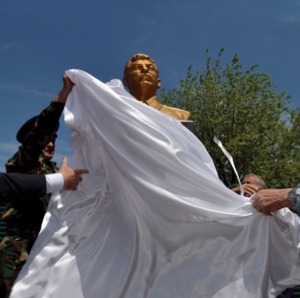1) The Catholic Church has a long way to go on child abuse
The Pope was talking tough on sexual abuse by Catholic priests this week, condemning bishops who have failed to "respond adequately" to reports of crimes by clergy, and begging forgiveness from victims for the harm done by members of the Church.
It all fits in with the narrative of Pope Francis's hard work in improving the Church's image in the year since his election, but are words being backed up by action? At the start of this week, the Church came under fire for refusing to release all of the files requested by the Australian Royal Commission into Institutional Responses to Child Sexual Abuse. If genuine progress is to be made on addressing the child abuse scandal, the Pope may wish to order Church officials to cooperate with such inquiries.
2) The Earth's magnetic field could be preparing to flip
Data collected by the European Space Agency suggest that the Earth's magnetic field could be set to reverse sooner than expected. It's not quite as dramatic as it sounds – the process has happened multiple times over the Earth's history and can take tens or hundreds of thousands of years to complete – but it does mean that, at some point in the future, magnetic north will become magnetic south, and vice versa.
While the news conjures apocalyptic images, scientists do not believe the reversal would produce effects of disaster-movie proportions, although it is thought that it would impact power grids and communications networks.
3) Even the Church of England seems sick of compulsory worship in schools
Last week, we reported that school governors had come out against the rule on compulsory daily acts of "broadly Christian" worship in schools, arguing that it is "meaningless" in a multicultural society. For some time, both the government and religious groups have resisted calls for an end to the rule, but now it seems that even the Church of England is beginning to realise that the practice is hard to defend in 21st-century Britain.
In an interview with the Daily Telegraph, the Rt Reverend John Pritchard, Bishop of Oxford and chair of the Church of England’s Board of Education, argued that, while schools should still make time for “spiritual reflection” in assemblies, compulsory worship could actually put young people off religion. "There is a sense in which a compulsion about religion does a disservice to that which I think is most important which is keeping the good news of the Christian faith alive in our culture," he said.
4) You can't refuse to bake a cake because it's too gay
Same-sex marriage has now been legalised in England, Wales and Scotland, but it remains unavailable to couples in Northern Ireland, where conservative religious groups are continuing to oppose reform. While the battle for equality will be fought in the courtrooms, with a legal challenge to the ban due later this year, it seems that it will also be fought in Northern Ireland's bakeries, following the revelation this week that a County Antrim cake shop refused to produce a cake featuring the Sesame Street characters Bert and Ernie, alongside a slogan endorsing gay marriage.
The cake, which was intended for consumption at International Day Against Homophobia and Transphobia celebrations at Bangor Castle Town Hall, was eventually baked by another supplier, but the reluctant bakers, Ashers Baking Company, could face legal action by the Equality Commission.
5) The US religious right is capitalising on the ruling on corporations' religious freedom
When the US Supreme Court ruled last week by a narrow margin that companies can refuse on religious grounds to pay for healthcare plans that include contraception provision, commentators and activists predicted that the decision could pave the way for further forms of discriminatory practice by American employers.
Sure enough, those predictions are looking accurate, as this week a group of faith organisations stepped up the pressure on the White House to exempt them from a forthcoming executive order that will outlaw discrimination against gay men and women by companies that do government work. With the Supreme Court backing up the claim that organisations can have religious rights, it could prove difficult for the Obama administration to resist such appeals.
6) When $11bn buys failure, football can have serious repercussions
It was all supposed to be so perfect – Brazil would host the World Cup for the first time since 1950, the world's most enthusiastic footballing nation would put on the world's greatest show, and at the end of it all the host team would lift the famous golden trophy to universal acclaim. Of course, it was clear as early as last summer that all was not well off the pitch, with protests and riots breaking out among Brazilians who objected to the $11bn price tag of hosting the tournament in a country where millions live below the poverty line, but initial performances on the pitch followed the script, and kept alive the prospect of a happy ending.
All that was shattered on Tuesday night, as Brazil lost 7-1 to Germany in the semi finals, in one of the most shocking sporting results of all time. As many commentators noted, it was ultimately only a football match, but without the consolation of a World Cup triumph, Brazilian voters may well focus on the economic cost and turn on the incumbent Dilma Rousseff in October's presidential election.
7) The Mars Curiosity Rover could use a tyre change
NASA's Curiosity Rover has produced stunning results since it landed on the Red Planet in August 2012, carrying out crucial scientific experiments and sending back glorious images of the surface of our near neighbour. But such fine work takes its toll – Mars is a rocky, unforgiving world and, as images released by NASA this week show, cracks and holes are beginning to appear in the Rover's aluminium wheels.
"We always expected we would get some holes in the wheels as we drove," explained project manager Jim Erickson. "It's just the magnitude of what we're seeing that was the surprise." Despite the damage, the team are still confident that Curiosity will be able to reach its ultimate destination, the foothills of Mars's 3.4-mile-high Mount Sharp.
8) The Archbishop of Canterbury plans to force through women bishops reform
For liberal Anglicans, the communion's refusal to approve reform allowing female bishops has long proved an embarrassment, hitting the headlines most recently in 2012 when the General Synod narrowly rejected legislation endorsed by leading church figures.
The Synod is set to vote on the issue again next week, but this time it appears the Church leadership has a contingency plan, with Archbishop of Canterbury Justin Welby apparently prepared to force through the reform even if it is rejected. However supporters of women bishops are confident that the General Synod will pass the measure when it votes on Monday.
9) If you're a Prime Minister, don't admit to having a hangover
When you become the head of a national government, there are certain things you can't do any more. Security concerns are bound to restrict your actions, but there is also your responsibility not to embarrass your country. Don't say anything silly, and don't do anything that makes you look silly. And definitely don't get drunk – only Boris Yeltsin ever managed to get away with that, and even that's debatable.
These are simple guidelines, but they appear to have eluded Australian Prime Minister Tony Abbott during his visit to Japan this week. He seemed to get on very well with his counterpart, Shinzo Abe, but may have ended up enjoying himself a bit too much – Australian media accused Abbott of looking a little “worse for wear” at a morning event after drinking sake with Abe the previous evening, something he admitted to, while adding that the drinking had been "responsible". During the trip, Abbott also managed to anger the Chinese by suggesting that Australians "admired the skill and the sense of honour" shown by Japanese forces in the Second World War, and draw criticism for a rather unfortunate photo op.

